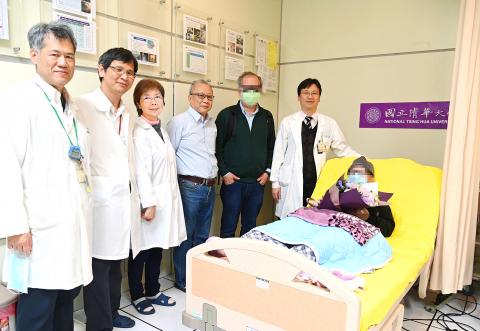More than 120 people with brain or head and neck cancer have been treated with a boron neutron capture therapy developed by National Tsing Hua University, a team of researchers said yesterday.
The nation’s only research nuclear reactor was owned by the university, which converted it into a device for clinical therapy and established the Boron Neutron Capture Therapy Center.
The conversion was not directly related to the nation’s change in nuclear power policy, center director Lee Min (李敏) said, adding that the university’s College of Nuclear Science had been exploring more applications for radiation.

Photo courtesy of National Tsing Hua University via CNA
In the 1990s, the college sent personnel to learn the therapeutic technique at the Massachusetts Institute of Technology, where the first clinical trials were conducted, he said, adding that only Taiwan and Japan have continued to develop and use it in clinical applications.
In the therapy, drugs containing boron — a nonmetal element used in nuclear reaction — are injected in cancer patients and accumulate in tumors, which are then irradiated by a neutron beam generated by the reactor, Institute of Nuclear Engineering and Science professor Chou Fong-in (周鳳英) said.
High-energy particles produced through nuclear reactions kill tumor cells without affecting normal cells, making the therapy suitable for combating tumors that are widespread and harder to surgically remove, she said.
After the cancer cells absorb the drugs, the high-energy radiation “ignites” the drugs, which function like “explosives,” annihilating the malignant cells, Taipei Veterans General Hospital oncologist Chen Yi-wei (陳一瑋) said.
Through a connection between the center and the International Society for Neutron Capture Therapy, a Spanish woman in October last year arrived in Taiwan for treatment of a malignant tumor in her brain stem, the team said, withholding the woman’s name to protect her privacy.
After receiving an examination at the hospital, the woman last month visited the center to receive the therapy, which reduced her tumor from 3.51cm to 1.06cm, it said.
As her second radiation session was scheduled for Feb. 14, the team helped the woman mark Valentine’s Day, with her husband — who is a physician — preparing a bouquet to celebrate her recovery, it added.
The woman has returned to Spain for follow-up observation, Lee said.
As it is a relatively new therapy, cancer patients can only receive it after careful evaluations by doctors and personnel from the center, and as well as with case-by-case approval from the Food and Drug Administration, he said.
Since the center started working with physicians at the hospital in 2010, more than 120 patients have received the therapy, he added.
The university is also working with the Taoyuan City Government on a planned affiliated hospital at the Taoyuan Aerotropolis, Lee said, adding that he hopes the therapy would benefit more patients.

The manufacture of the remaining 28 M1A2T Abrams tanks Taiwan purchased from the US has recently been completed, and they are expected to be delivered within the next one to two months, a source said yesterday. The Ministry of National Defense is arranging cargo ships to transport the tanks to Taiwan as soon as possible, said the source, who is familiar with the matter. The estimated arrival time ranges from late this month to early next month, the source said. The 28 Abrams tanks make up the third and final batch of a total of 108 tanks, valued at about NT$40.5 billion

Travel agencies in Taiwan are working to secure alternative flights for travelers bound for New Zealand for the Lunar New Year holiday, as Air New Zealand workers are set to strike next week. The airline said that it has confirmed that the planned industrial action by its international wide-body cabin crew would go ahead on Thursday and Friday next week. While the Auckland-based carrier pledged to take reasonable measures to mitigate the impact of the workers’ strike, an Air New Zealand flight arriving at Taipei from Auckland on Thursday and another flight departing from Taipei for Auckland on Saturday would have to

A group from the Taiwanese Designers in Australia association yesterday represented Taiwan at the Midsumma Pride March in Melbourne. The march, held in the St. Kilda suburb, is the city’s largest LGBTQIA+ parade and the flagship event of the annual Midsumma Festival. It attracted more than 45,000 spectators who supported the 400 groups and 10,000 marchers that participated this year, the association said. Taiwanese Designers said they organized a team to march for Taiwan this year, joining politicians, government agencies, professionals and community organizations in showing support for LGBTQIA+ people and diverse communities. As the first country in Asia to legalize same-sex

MOTIVES QUESTIONED The PLA considers Xi’s policies toward Taiwan to be driven by personal considerations rather than military assessment, the Epoch Times reports Chinese President Xi Jinping’s (習近平) latest purge of the Chinese People’s Liberation Army (PLA) leadership might have been prompted by the military’s opposition to plans of invading Taiwan, the Epoch Times said. The Chinese military opposes waging war against Taiwan by a large consensus, putting it at odds with Xi’s vision, the Falun Gong-affiliated daily said in a report on Thursday, citing anonymous sources with insight into the PLA’s inner workings. The opposition is not the opinion of a few generals, but a widely shared view among the PLA cadre, the Epoch Times cited them as saying. “Chinese forces know full well that